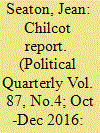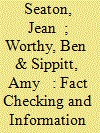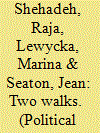|
|
|
Sort Order |
|
|
|
Items / Page
|
|
|
|
|
|
|
| Srl | Item |
| 1 |
ID:
149205


|
|
|
|
|
| Summary/Abstract |
The Brexit referendum was won in the regions: in the areas where local reporting of local issues has been withering away for decades. Much of the country outside London has no local press. Three quarters of newspaper offices in regional towns have closed since 1999; locally employed journalists (living in the communities they report on) have all but disappeared; courts, hospitals, councils go unreported.1 What purports to be ‘local’ news is all too often just cross-syndicated content produced from the Midlands production hubs of monopolistic newspaper chains.
|
|
|
|
|
|
|
|
|
|
|
|
|
|
|
|
| 2 |
ID:
149232


|
|
|
| 3 |
ID:
174682


|
|
|
|
|
| Summary/Abstract |
The Covid‐19 pandemic has revealed and accelerated an information crisis as well as a health one. What we discover about Covid 19, how it spreads, to whom and why and how best to mitigate it—all depend on information. The essays in this special section, which this article introduces, explore the importance of information and the fundamental role of fact checkers in understanding how information flows, why mistakes are made, and how to counteract them. Fact checking as an idea and a practice emerged in the early twenty‐first century, developed as a positive beacon to counteract a growing sense that information could no longer be trusted. Now, more than a decade after its creation, fact checking sits within a far more complex and chaotic media context, and its expertise and understanding has never been so important. We need to understand what fact checkers do because they are grappling with how to tether us to reality.
|
|
|
|
|
|
|
|
|
|
|
|
|
|
|
|
| 4 |
ID:
040113


|
|
|
|
|
| Publication |
Aldershot, Avebury, 1987.
|
| Description |
xviii, 266p.
|
| Standard Number |
0566009307
|
|
|
|
|
|
|
|
|
|
|
|
Copies: C:1/I:0,R:0,Q:0
Circulation
| Accession# | Call# | Current Location | Status | Policy | Location |
| 029152 | 302.23080941/SEA 029152 | Main | On Shelf | General | |
|
|
|
|
| 5 |
ID:
049090


|
|
|
|
|
| Edition |
5th ed.
|
| Publication |
London, Routledge, 1997.
|
| Description |
viii, 420p.
|
| Standard Number |
0415168104
|
|
|
|
|
|
|
|
|
|
|
|
Copies: C:1/I:0,R:0,Q:0
Circulation
| Accession# | Call# | Current Location | Status | Policy | Location |
| 039985 | 072/CUR 039985 | Main | On Shelf | General | |
|
|
|
|
| 6 |
ID:
086966


|
|
|
|
|
| Publication |
2009.
|
| Summary/Abstract |
In the summer of 2008 novelist Marina Lewycka and author and human rights lawyer Raja Shehadeh went on two walks: the first in Palestine near Ramallah near the Beit Eil Jewish settlement, the second on Kinder Scout in the Peak District, the site of the mass trespass in 1932 to reclaim the right to walk on the hills. This account of the conversation they recorded on the second walk includes observations by Marina on writing about Palestine and Israel and reflections by Raja about the effect of the Israeli occupation on the fragile Palestinian landscape. It also includes their discussions on writing, walking and the meaning it has to each of them, as well as political comments on the Israeli-Palestinian conflict evoked by visiting these sites. They wonder whether a similar act of resistance would be possible in Palestine and what it would mean to the future of the conflict.
|
|
|
|
|
|
|
|
|
|
|
|
|
|
|
|
| 7 |
ID:
073729


|
|
|
|
|
| Publication |
Malden, Blackwell Publishing, 2006.
|
| Description |
164p.
|
| Standard Number |
1405136936
|
|
|
|
|
|
|
|
|
|
|
|
Copies: C:1/I:0,R:0,Q:0
Circulation
| Accession# | Call# | Current Location | Status | Policy | Location |
| 051609 | 302.23/LIO 051609 | Main | On Shelf | General | |
|
|
|
|
| 8 |
ID:
099086


|
|
|
|
|
| Publication |
2010.
|
| Summary/Abstract |
The new Parliament will be asked at some point to make critical decisions about the BBC's future at a time when it is facing full-frontal assaults from competitors who view the BBC as a major barrier to their own advancement. Whether it be newspaper groups seeking to monetise their online activities, commercial children's channels, terrestrial competitors or the owners of music radio stations, media conglomerates rail against the BBC's size and public funding with increasing regularity. Our aim is to remind our legislators of the vital contribution this institution makes to British life: from a journalism inscribed with values of fairness, integrity and impartiality-and valued throughout the world for its professional engagement with foreign affairs-to its creative commitment to British story-telling, music, comedy, arts and children's programmes, the BBC's contribution to our democratic and cultural welfare is immense. It is a beacon for Britain, which provides social glue for its citizens at a time of fragmenting audiences and identities, within a uniquely non-commercial space, accountable to both Parliament and its licence payers. It may distort the market, much as the National Health Service distorts the market for health care, but is held in high esteem by the British public and is admired throughout the world. This article explains why the BBC is a national treasure that underpins our creative economy as well as our cultural vitality, and argues that it must be protected from those who argue self-interestedly for its diminution.
|
|
|
|
|
|
|
|
|
|
|
|
|
|
|
|
|
|
|
|
|